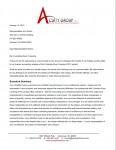In a white paper presented to transportation officials this week, forensic accountant Tiffany Couch slammed what she calls a “severe lack of accountability, transparency, and oversight” in managing the $10 billion* Columbia River Crossing Light Rail (CRC) project.
Couch, owner of Vancouver-based Acuity Group, met Thursday with the area’s political and transportation representatives. She said CRC project officials were invited but did not attend.
Accounting and contracting practices for the CRC project “are characterized by irregularities and planning missteps on many fronts,” Couch writes in her white paper, and adds that a delay of the project may be in order while the problems are ironed out.The bridge, highway, and light rail project is touted as easing congestion via a 10-lane bridge structure, better highway interchanges and the extension of Portland’s light rail into Vancouver. CRC will require $1.25 billion in federal highway and transit funds, $900 million in state funds split between Oregon and Washington, and $1.3 billion in tolls.
But Couch and other of the project’s detractors want a simpler, less pricey option. The light rail component of the project also raises fears about increased crime.
One of the many issues Couch presents in her paper is the lack of basic financial statements. She writes that during a meeting last year with CRC and Washington State Department of Transportation she was told that because the CRC is a “project office and not an agency” it is not required to keep basic financial statements.
The CRC financial nightmare
That root problem, Couch says, branches into a series of number-crunching nightmares. For example, accounting data provided by the Washington Department of Transportation (WSDOT) shows that $125.3 million was spent on the CRC project between May 2005 and June 2011. Of that, nearly 71 percent – $88.5 million – was paid to a single vendor, Portland-based David Evans and Associates.
Oregon Department of Transportation figures, on the other hand, show it spent $5.7 million during the same period. So the total, Couch points out, is $131 million through June 30, 2011, the latest date on which financial data is available.
The actual construction project is now expected to cost taxpayers $3.2 billion – before accounting for any construction cost overruns, financing and interest costs, and operation and maintenance of the light rail – Couch writes.
Couch also decried what she sees as a severe lack of competitive bid process. Only a single potential contractor, David Evans, submitted a statement of qualifications. To date, Couch adds, the David Evans contract is estimated to cost $105 million; 120 percent more than the originally executed agreement’s price.
There is an “urgent need for you to intervene, terminate or delay further spending, and further investigate the CRC project,” Couch urges lawmakers.
Couch’s expertise includes fraud investigation, forensic accounting, contract and regulatory compliance, internal control risk assessment, and complex litigation. She is the founder of Acuity Group and previously worked with RGL Forensic Accountants and Consultants, Moss Adams, M.Green and Company, and Knight, Vale, and Gregory, and Boeing.
Our coverage on Tiffany Couch’s white paper will continue. To download a PDF of her entire white paper, see below.Tiffany Couch’s CRC White Paper.
* The well-documented cost to taxpayers, if the CRC stays on budget, is $10 billion. This was established by the Cortright Report (PDF) which used data from an independent review panel hired by the governors of Washington and Oregon. (View the panel’s final report.)
See our continuing coverage of the Columbia River Crossing Light Rail project.
Do you have information to share on the CRC? To respond anonymously call 260-816-1426. To allow your comments to be used on COUV.COM call 260-816-1429.












[...] See also Couv.com for Forensic accountant slams high costs, low competition of CRC [...]
[...] See also Couv.com for Forensic accountant slams high costs, low competition of CRC [...]
[...] independent audit of the finances of CRC raised several questions with no answers forthcoming from elected officials. [...]
[...] [17] Forensic Accountant – CRC a financial nightmare https://couv.com/sidebar/tiffany-couch-crc-white-paper [...]
[...] [17] Forensic Accountant – CRC a financial nightmare https://couv.com/sidebar/tiffany-couch-crc-white-paper [...]